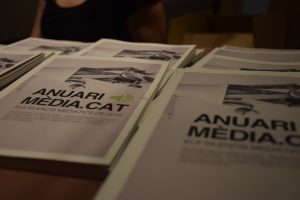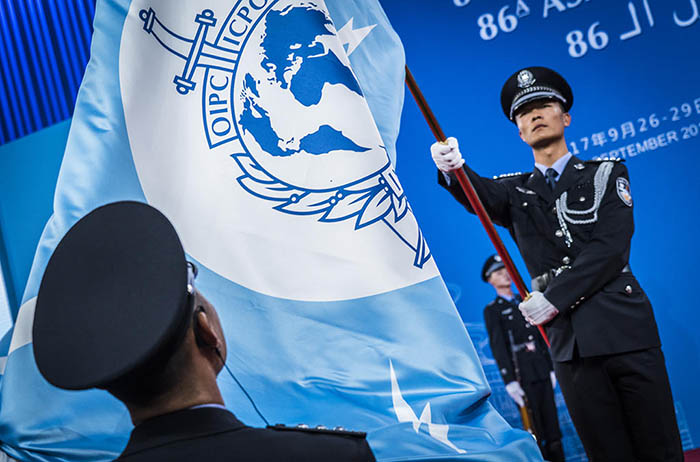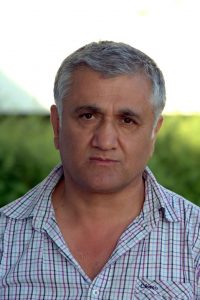6 Apr 2018 | Awards, Fellowship 2018, News
[vc_row][vc_column][vc_video link=”https://youtu.be/Kuztv8blNgY”][vc_column_text]
Mèdia.cat is a Catalan website devoted to highlighting media freedom violations and investigating under-reported or censored stories. Unique in Spain, it has been a particularly significant player in the last year when the heightened atmosphere in Catalonia over the disputed October independence referendum has brought issues of censorship and the impartiality of news, as well as the actions of public bodies like the police and government, under the spotlight.
Without the website, there would have been no online platform to catalogue systematically, publicly and in real time censorship perpetrated by the Spanish authorities against the local Catalan population. One of its most high-profile initiatives has been its Map on Censorship. This was set up two years ago in response to the Spanish government approving a so-called gag law, limiting the right to protest and effectively stopping people filming police officers. The Map on Censorship website was used particularly effectively during the 2017 crisis over the Catalan referendum campaign, giving the population in Catalonia live information about censorship, and other violations.
Between September and November 2017 as part its Map on Censorship initiative, journalists at Mèdia.cat documented and raised awareness about more than 125 possible restrictions on freedom of expression or information. All the incidents were related to the independence referendum in Catalonia of 1 October 2017, including both the lead up to the poll and its aftermath. The site deployed a team of 11 volunteer journalists to provide live updates on media freedom violations. The crisis in Catalonia in the last few months increased the reach and significance of the Map on Censorship with the map having 55,523 visits from 1 January to 12 November 2017.
Mèdia.cat describes itself as a critical media watchdog. It is run by a group of local Catalan journalists and publishes in Catalan about Catalonia. The financing for Mèdia.cat projects comes from a variety of sources including grants from the Catalan local government and the Barcelona City Council, crowdsourcing, foundations and donations. Mèdia.cat maintains its independence and is part of the Ramon Barnils group of journalists.
Mèdia.cat’s Hate Speech Media Watchdog ( https://www.media.cat/discursodimitjans/) also identified eight far-right media outlets in Spain which use fake news and other strategies to spread racism, xenophobia and islamophobia, among other forms of discrimination.

On their spot on the 2018 shortlist, Journalist at Mèdia.cat said “It is a great honor to be nominated to the Freedom of Expression awards. We were inspired by Index on Censorship’s work when we launched our Map on Censorship in 2015, which nowadays has become one of our most relevant projects. The nomination itself feels like an award for us. Especially in the current context, where freedom of expression is at stake in Catalonia and the Spanish state. Journalists have suffered physical aggressions, threats and other restrictions to their jobs, some artists have been censored and even retweeting a critical message can get you accused. We need to fight against this situation, unique in Western Europe, and this nomination is a great encouragement to do so.”
See the full shortlist for Index on Censorship’s Freedom of Expression Awards 2018 here.[/vc_column_text][/vc_column][/vc_row][vc_row full_width=”stretch_row_content” equal_height=”yes” el_class=”text_white” css=”.vc_custom_1490258749071{background-color: #cb3000 !important;}”][vc_column width=”1/2″][vc_custom_heading text=”Support the Index Fellowship.” font_container=”tag:p|font_size:28|text_align:center” use_theme_fonts=”yes” link=”url:https%3A%2F%2Fwww.indexoncensorship.org%2Fsupport-the-freedom-of-expression-awards%2F|||”][vc_column_text]
By donating to the Freedom of Expression Awards you help us support
individuals and groups at the forefront of tackling censorship.
Find out more
[/vc_column_text][/vc_column][vc_column width=”1/2″ css=”.vc_custom_1521479845471{background-image: url(https://www.indexoncensorship.org/wp-content/uploads/2017/05/2017-awards-fellows-1460×490-2_revised.jpg?id=90090) !important;background-position: center !important;background-repeat: no-repeat !important;background-size: cover !important;}”][/vc_column][/vc_row][vc_row][vc_column][vc_basic_grid post_type=”post” max_items=”4″ element_width=”6″ grid_id=”vc_gid:1522918006370-df72cba5-2f37-3″ taxonomies=”10735″][/vc_column][/vc_row]
24 Oct 2017 | Mapping Media Freedom, Media Freedom, media freedom featured, News
[vc_row][vc_column][vc_column_text]

Interpol 86th general assembly (Credit: Interpol)
Red notices have become a tool of political abuse by oppressive regimes. Since August, at least six journalists have been targeted across Europe by international arrest warrants issued by Turkey, Azerbaijan, Uzbekistan and Kazakhstan.
“The use of the Interpol system to target journalists is a serious breach of media freedom. Interpol’s own constitution bars it from interventions that are political in nature. In all of these cases, the accusations against the journalists are politically motivated,” Hannah Machlin, project manager for Index on Censorship’s Mapping Media Freedom, said.
In the most recent case on 21 October, journalist and blogger Zhanara Akhmet from Kazakhstan was detained in Ukraine on an Interpol warrant and is currently in a temporary detention facility. Akhmet claims this red notice is politically motivated.
The journalist worked for an opposition newspaper, the Tribune, in Kazakhstan as well as documented human rights violations by the Kazakh authorities on a blog.
On 14 October, also in Ukraine, Azerbaijani opposition journalist Fikret Huseynli was detained at Kyiv Boryspil Airport.
Huseynli sought refuge in the Netherlands in 2006 and was granted citizenship two years ago. While leaving Ukraine, the journalist was stopped by Interpol police with a red notice issued at the request of the Azerbaijani authorities. He has been charged with fraud and illegal border crossing.
Because Huseynli holds a Dutch passport, he cannot be forcibly extradited to Azerbaijan, but he told colleagues he fears attempts to abduct him.
“The arrest of the Azerbaijani opposition journalist by the Ukrainian authorities at the request of the authoritarian government of Azerbaijan is a serious blow to the common European values such as protection of freedom of expression, which Ukraine has committed itself to respect as part of its membership in the Council of Europe and the OSCE,” IRFS CEO Emin Huseynov said.
On 17 October, Boryspil City District Court ruled to imprison Huseynli for 18 days at a pre-trial detention centre, Huseynli’s lawyer announced.
Huseynli’s arrest was the second time in a month that a journalist has been detained in Ukraine on a red notice.
On 20 September, authorities detained journalist Narzullo Okhunjonov, who had been seeking political asylum in Ukraine, under an Interpol red notice when he arrived from Turkey with his family. Okhunjonov writes from exile for sites including BBC Uzbek on Uzbekistan’s authoritarian government. Uzbekistan filed the international arrest warrant for the journalist on fraud charges. He denies the charges against him.
Five days after he was detained, a Kyiv court sentenced Okhunjonov to a 40-day detention while they decide whether to extradite him to his home country. [/vc_column_text][/vc_column][/vc_row][vc_row][vc_column width=”1/4″][vc_icon icon_fontawesome=”fa fa-times-circle” color=”black” background_style=”rounded” size=”xl” align=”right” link=”url:https%3A%2F%2Fmappingmediafreedom.org%2F%23%2F|||”][/vc_column][vc_column width=”3/4″][vc_column_text]
Since 24 May 2014, Mapping Media Freedom’s team of correspondents have recorded and verified 3,597 violations against journalists and media outlets.
Index campaigns to protect journalists and media freedom. You can help us by submitting reports to Mapping Media Freedom.[/vc_column_text][/vc_column][/vc_row][vc_row][vc_column][vc_column_text]Interpol warrants have also been issued in Spain.
Turkish journalist Doğan Akhanlı was detained while on vacation in Spain on 9 August. The journalist has lived in Cologne since 1992 where he writes about human rights issues, particularly the Armenian Genocide, which Turkey denies.
Turkey charged Akhanlı with armed robbery which supposedly occurred in 1989. After the charges were brought against him in 2010 and he was acquitted in 2011, the Supreme Court of Appeals overturned his acquittal and a re-trial began. Akhanlı faces “life without parole”.
Two weeks later, Interpol removed the warrant and Akhanlı was released. The decision was made after German chancellor Angela Merkel denounced the abuse of the Interpol police agency: “It is not right and I’m very glad that Spain has now released him. We must not misuse international organisations like Interpol for such purposes.”
Markel claimed Erdogan’s use of the international agency for political purposes was “unacceptable”.
Akhanlı’s detention came two weeks after Turkish journalist Hamza Yalçın was detained on 3 August at El Prat airport in Barcelona, where he was vacationing, Cumhuriyet reported. He holds a Swedish passport and has sought asylum there since 1984.
Yalçın is being accused of “insulting the Turkish president” and spreading “terror propaganda” for Odak magazine of which he was the chief columnist, according to a report by Evrensel.
Like Ukraine, Spain’s member state status in the Council of Europe also arises the question of their activity in the arrests of Akhanlı and Yalçın. “The latest cases of arrests of journalists in Ukraine and Spain on the basis of Interpol red notices … have extremely worrying implications for press freedom,” Rebecca Vincent UK Bureau Director for Reporters Without Borders, said. “Interpol reform is long overdue, and is becoming increasingly urgent as critical journalists are now at risk travelling even in Council of Europe member states”.
Turkey’s recent continued persecution of journalists through Interpol also reached as far as Germany. A Turkish prosecutor has requested the Turkish government issue a red notice through Interpol though it is unclear if it went through.
On 28 September 2017, the Diyarbakir Prosecutor’s Office filed an application to seek an Interpol red notice for Can Dündar, the former Editor-in-chief of Turkey’s anti-regime newspaper, Cumhuriyet. The demand for a red notice is based on a speech made by Dündar in April 2016, supposedly supporting the “terror propaganda” of the outlawed Kurdistan Workers’ Party (PKK).
Dündar fled Turkey for Germany in 2016.
On the same day, Peace Research Institute Oslo (PRIO) nominated Dündar and the Cumhuriyet newspaper for the Nobel Peace Prize.
“Turkey is no exception to using this system just as is Russia, Iran, Syria, and its close neighbour and ally Azerbaijan among other governments, where political direction does not necessarily align with democracy, respect for human rights and basic freedoms,” Arzu Geybulla, an Azerbaijani journalist and human rights activist said. “Targeting its citizens who have escaped persecution and have been forced to flee as a result of their opinions, is a worrying sign especially at a time, when over 160 journalists are currently behind bars in Turkey and thousands of people have lost their jobs, been arrested or currently face trials in the aftermath of the July coup.”
Although PACE has adopted a resolution condemning the abuses of Interpol red notices, a review of Interpol’s red notice procedure has yet to be adopted. Amid criticism from human rights activists, journalists, and even leaders like Angela Merkel, it is unclear if Interpol will make a change to their red notice regulations.[/vc_column_text][vc_row_inner][vc_column_inner][/vc_column_inner][/vc_row_inner][/vc_column][/vc_row][vc_row][vc_column][vc_basic_grid post_type=”post” max_items=”4″ element_width=”6″ grid_id=”vc_gid:1509034712367-374920af-c5df-6″ taxonomies=”6564″][/vc_column][/vc_row]
9 Aug 2017 | Campaigns -- Featured, Statements, Turkey, Turkey Statements
[vc_row][vc_column][vc_column_text]

Hamza Yalçın (Photo: Odak magazine)
The arrest of Turkish-Swedish journalist Hamza Yalçın by Spanish authorities is a gross abuse of the Interpol international arrest warrant system and a brazen attempt to stifle press freedom by Turkey’s president, Recep Tayyip Erdogan. Index on Censorship calls on Spanish authorities to allow Yalçın to return to Sweden.
Yalçın was detained at Barcelona’s El Prat airport on 3 August following an international arrest warrant through Interpol initiated by Turkey.
A day later he was arrested by Spanish police on charges of “insulting the Turkish president” and “terror propaganda” related to an article he wrote for Odak magazine. Yalçın was the chief columnist for Odak and the coordinator for its Training and Solidarity Movement. On 18 March, Turkish prosecutors launched an investigation into Doğan Baran, Odak’s managing editor, and Yalçın for his article entitled The Latest Developments in the Military and the Revolutionary Struggle. Both Baran and Yalçın face charges for “insulting the president” and “denigrating the military.”
“This is a clear abuse of the Interpol system because it is a direct violation of Article 2 of its constitution, which requires respect for fundamental rights and freedoms of individuals. It is extremely concerning that an exiled journalist can be arrested for exercising their right to freedom of expression,” said Hannah Machlin, project manager for Mapping Media Freedom, Index on Censorship’s project monitoring press freedom in Turkey and 41 other European area countries.
The Spanish authorities now have 40 days to decide whether to extradite Yalçın back to Turkey.
“Index demands Spain free Hamza Yalçın and allow him to return to his home in Sweden,” Machlin added.
Yalçın was arrested in 1979 on charges of being linked to the People’s Liberation Party-Front of Turkey (THKP-C) Third Way organization. Odak reported that Yalçın was given two consecutive life sentences by the military junta, which was then in control of the Turkish government, for his “revolutionary activities.” He was granted asylum by Sweden and has lived there since 1984.
Odak magazine, which is campaigning for his release, said in a statement that Yalçın “has been made into a target many times for his articles and values.”
The Council of Europe’s parliamentary assembly published Resolution 2161 in April 2017 on the abuse of the Interpol system. The resolution underlined that “in a number of cases in recent years, however, Interpol and its Red Notice system have been abused by some member States in the pursuit of political objectives, in order to repress freedom of expression.” [/vc_column_text][vc_separator][vc_custom_heading text=”Media freedom is under threat worldwide. Journalists are threatened, jailed and even killed simply for doing their job.” font_container=”tag:h3|text_align:left” use_theme_fonts=”yes” link=”url:https%3A%2F%2Fwww.indexoncensorship.org%2Fcampaigns%2Fpress-regulation%2F|||”][vc_row_inner][vc_column_inner width=”1/2″][vc_column_text]Index on Censorship monitors press freedom in Turkey and 41 other European area nations.
As of 9/8/2017, there were 503 verified incidents associated with Turkey in the Mapping Media Freedom database.[/vc_column_text][/vc_column_inner][vc_column_inner width=”1/2″][vc_column_text]Index on Censorship campaigns against laws that stifle journalists’ work. We also publish an award-winning magazine featuring work by and about censored journalists. Support our work today.[/vc_column_text][/vc_column_inner][/vc_row_inner][vc_separator][/vc_column][/vc_row][vc_row][vc_column][vc_basic_grid post_type=”post” max_items=”12″ style=”load-more” items_per_page=”4″ element_width=”6″ grid_id=”vc_gid:1502284900540-fbb3abe9-4651-4″ taxonomies=”55″][/vc_column][/vc_row]
4 Jul 2017 | Digital Freedom, Europe and Central Asia, Mapping Media Freedom, News, Spain
[vc_row][vc_column][vc_column_text]
Within the last month, Index on Censorship’s Mapping Media Freedom platform has recorded a number of restrictions on media access to events in Spain by police and politicians.
Melody Patry, Index’s head of advocacy, called to attention these encroachments on press freedoms by Spanish law enforcement: “The police are clearly — intentionally or not — restricting access to information and interfering with legitimate journalistic work,” she said. “This further highlights the need for improved policy and training of law enforcement bodies to protect freedom of expression and ensure journalists’ safety.”
On 10 June, police officers blocked access to journalists covering an eviction in Santiago de Compostela and threatened to fine them.
During a protest against an eviction, police obliged reporters to stand behind the police cordon a hundred meters from where the eviction was taking place. This restricted access made it difficult for the journalists to see and report on the event.
Police agents in plain clothes asked reporters for their IDs and personal documents while simultaneously refusing to identify themselves. According to the journalists, the police acted aggressively, wielding batons against them, threatening them with fines for taking photos and warning reporters that photos already taken would be erased.
Journalist Cristina Fallarás received a €600 fine on 13 June for disobeying police orders and standing on the street during a Madrid protest.
On 18 May, Fallarás participated in a protest against the assassination of Mexican journalists in front of the Mexican embassy in Madrid. Police cordoned off a road near the embassy. “There were so many people at the protest, we were squeezed, so I went on the road. A policeman told me to go back to the pavement,” the journalist told Público. Fallarás then explained to the policeman that she had not interrupted traffic on the road and that there were many people on the pavement. He asked for her ID.
“When I gave my ID I knew they were going to fine me but I didn’t think it would be a €600 fine,” Fallarás said. She was fined according to the Citizen Security Law, which some critical media outlets have called a ‘gag law’. She was notified of the fine on 13 June and has indicated a plan to appeal it.
On 16 June, the Spanish newspaper El País removed an article it had published on the parliament spokesman of the ruling party because the editor-in-chief considered it to be “inappropriate”.
The article criticised the behaviour of MP Rafael Hernando during a debate with MP Irene Montero. Within the opinion article, author Salazar called Hernando a “male chauvinist and misogynist”.
“They (El País) told me that the article is fantastic, that it will be published on the cover page of the web edition,” Salazar told Público. A few hours later, after 300 comments appeared on the article, El País told Salazar that the editor-in-chief, Antonio Caño, had read the article and said that it would have to be either “softer” or removed. “I told them that there was nothing to change,” said Salazar. He received another phone call, this time from the director of El País, who told him that to call Hernando a “male chauvinist and misogynist” was not appropriate. The article was then removed from the website.
The left-wing Podemos party failed to invite six Spanish media outlets to an “off the record” breakfast briefing on 20 June where they introduced the new party spokespeople to the rest of media.
Podemos excluded reporters from El País, la Cadena SER, El Periódico de Catalunya and online outlets El Independiente, Voz Pópuli and Ok Diario. The Madrid Press Association called it a “veto” on the media and asked Podemos to refrain from such actions in the future. According to the APM, all affected journalists typically report on Podemos.
Podemos’ members say that the party has a right to decide who will be invited to their private events and that there was a lack of confidence with the reporters in question.[/vc_column_text][/vc_column][/vc_row][vc_row][vc_column][vc_column_text]
Mapping Media Freedom
Click on the bubbles to view reports or double-click to zoom in on specific regions. The full site can be accessed at https://mappingmediafreedom.org/[/vc_column_text][/vc_column][/vc_row]





